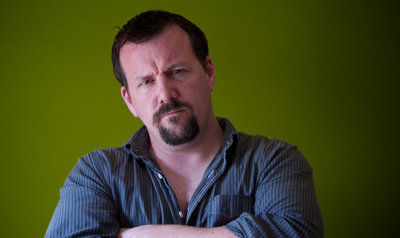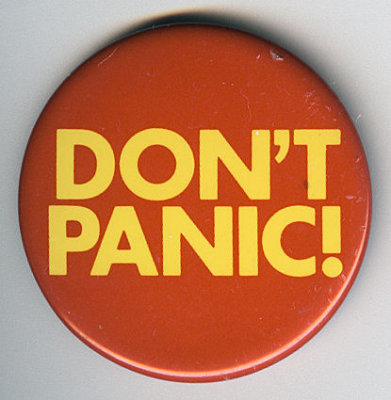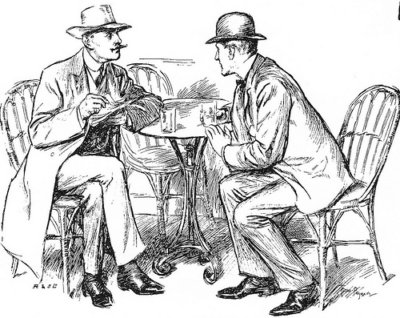Don’t Like Your Therapist? Before You Panic Read This

By: bark
Deciding to actually take that big step and go to therapy, then getting out and finding a therapist, can be an ordeal in and of itself.
To suddenly find you don’t like the therapist you’ve booked can feel a real blow. What do you do if this is the case?
7 Important Tactics For When You Don’t Like Your Therapist
1) Stay calm.
Such is the power of therapy that even one session can leave you feeling more emotional and vulnerable than usual. And maybe you are not sure who to talk to about your therapist, or your friends don’t even know you are therapy in the first place. (Isn’t it a shame that we can’t all talk about our psychological health like we talk about our physical health? It’s something we at Harley Therapy are committed to helping happen).

By: Jim Linwood
But take a deep breath, because here’s the good news. It’s actually normal to not instantly like your therapist.
Think about it logically. How often have you gone on a date and liked the other person right away? Or started a new job and instantly liked your colleagues and boss? Therapy is no different.
We are not all designed to get along. And just because someone is a therapist does not make them instantly perfect or likeable. Therapists are, shock horror, humans.
That aside, it’s important not to let your panic make you make rash decisions over what to do just yet.
2) Fire your inner drama queen first.
While you might feel so upset you are preparing to instantly fire your therapist and give up on therapy altogether, try to put paid to dramatic thinking first.
Dramatic thinking, also known as ‘black and white thinking‘, tends to come out as grand or extreme statements that have us talking ourselves out of the step forward we have just taken. Examples might be, “Therapy obviously doesn’t work”, “Therapists are weird”, or “I am not suited to this sort of arrangement”.
If you were in the market for a new vehicle, and drove one car but didn’t like it, would you then declare, “I am just not a driver” or “driving doesn’t work?”
The truth is that dramatic thinking and panic can both often be our mind”s way of throwing up a smoke screen so we don’t have to face up to what’s really going on for us.
Like that perhaps you are scared of what therapy is stirring up for you, or how vulnerable it makes you feel.
(If you are still sure you really are going to fire your therapist, read our piece ‘Help! I Want to Fire My Therapist! first).
3) Focus on the facts.
You hired a therapist to work with you, not to be an instant friend. It’s actually a business deal, not a personal one, no matter how intimate the therapy room can feel.
Take the time to do more research on what to expect from therapy in the long-term, focussing on a balanced picture of both the highs and lows.
Learn about what therapists are like and what you can expect of them. It means you know what to look for if you do decide to find another one.
Also look into the different kinds of therapy available. You might simply not have chosen one that suits you.
Then get real about the true reason you don’t like your therapist. It might really be they are wrong for you. But if you are coming up with flimsy things like, ‘they dress funny’, ‘the office smelt weird’, or ‘I don’t like the way they looked at me’, then it might just be that there is more at play here than you are admitting to.
Is it plain old nerves? Fear of the unknown? Are you maybe scared of the change you can feel therapy will mean? Or, like many of us who seek therapy, is it possible that the sheer intimacy of the therapy room has you freaking?
Try some journalling over talking to others. Without an audience, we tend to be more honest with ourselves.
4) Follow the ‘Rule of Four’.

By: Marco Ghitti
The truth about finding a therapist is that it is rather like dating. There are many types of therapy, and millions of therapist out there. Expecting to find your perfect therapist right out the gate is pretty unlikely.
But at the same time, again like dating, you can’t really judge someone from the first date. If you do so, you tend to miss out on really good life partners who you can benefit from in the long run.
Give the therapist a fair chance surprise you by using the ‘Rule of Four’.
It’s really the rule of three in disguise, because the first session of therapy tends to be an assessment. Even if you get to appointment three and think it’s going dreadfully, push onwards through number four. For some reason it seems to be the session where the click most often happens – or doesn’t, meaning you can walk away sure you made the right choice.
5) Learn about transference.
Transference is therapy speak for a kind of projection. More precisely, it is when we unconsciously take feelings we have towards one person, situation, or object and then move them onto another person, situation, or object, without realising it or they are really nothing to do with why we feel the way we do.
A simple example is when you’ve had a really rough day at work but stayed cool, only to come home and freak out on your partner because she asks you to load the dishwasher more carefully.
(read more about transference in our article, How to deal with transference in therapy).
The most discussed form of transference when it comes to therapy, probably because it makes for good film and TV drama, is romantic or sexual attraction.
But it’s actually just as common to experience negative transference in the therapy room. Say, for example, your father made you feel controlled, you might find you treat your male therapist like a childish rebel.
Which brings us back to the issue at hand – not liking your therapist. Ask yourself, who does she/he remind me of? Is it really him I don’t like, especially if I have only done a few sessions and don’t know him? Is she triggering any childhood pattern? Am I unconsciously seeing him or her as one of my parents, family members, or person from the past I didn’t like such as a teacher?
Is it possible that this therapist you aren’t sure you like is actually a chance for you to sort out unresolved feelings in a safe environment for this other person from the past?
6) Talk to your therapist about it.

By: Lovelorn Poets
Convinced the best way to end this disastrous scenario of not liking your therapist is to send off a quick email saying you’ll no longer be attending?
It’s a normal reaction. Perhaps in the past your attempts to be honest with others have led to you feeling rejected or judged.
But if there is one person in the world who can handle you saying you aren’t sure you click with them, it’s a therapist. They are not going to be mad at you if you tell them you aren’t sure they are for you, they are going to help you see what is behind that. And you paid for the chance to explore yourself. Why not also explore your fear of being straightforward?
At the very least they can help you understand what other forms of therapy might suit you best, or even help you in finding a therapist that is more suited for you.
If you really can’t bear it, and you hired your therapist through an umbrella company, try talking to the administrator. You never know what can come of it.
(For example, while some companies offer nothing in ways of compensation if you change your mind about your therapist, at Harley Therapy we not only don’t make you go through another assessment if you switch therapists, we offer you a session with a new therapist free of charge).
7) And seriously? Stay in therapy.
You have every right in the world to change therapists and find one that suits you. And doing so can be a good experience of asserting yourself and learning more about your options.
Most of the time, wanting to quit therapy is a sign that we really can benefit from therapy. It means intimacy issues or relating issues have been triggered, or our inability to communicate our feelings effectively is being called to account.
You’ve made the first step, and you’ve cracked open the lid of the Pandora’s box. At this point, it’s often actually easier to go forward than back, no matter what it might feel like in this moment. Suppressing emotions once they start to rise is harder than it sounds, and can lead to low grade depression, whereas processing them might be hard, too, but leads to relief and life change.
If you really are sure you want to quit therapy, why not set a ‘stop time’ sometime in the future, instead of quitting from a place of high emotions? For example say, okay, I’ll do those four sessions then I can quit. And then see what happens.
Do you have a tip for what to do if you don’t like your therapist? Share below.






The thing is… It’s really disrespectful to clients and can really mess with people’s heads(mine definitely) if everything a client says and does is interpreted as symptomatic of something wrong with them emotionally. What about actually listening as a human being and asking for clarification rather than making wild interpretations that if made in the first sessions are almost definitely mostly wrong. I think there needs to be some safety built in, perhaps where the client says – I really mean it – meaning this is not open to your interpretation but i really want you to take what I said seriously in the here and now – because otherwise my head is spinning and I feel mind f—ed. If first sessions are deemed for “assessment”, i would really like some equality built into the relationship: I had given a list of questions to the therapist and concerns but these had 5 minutes to be addressed at the end but the therapist had all the other time – to say some really srtange stuff that nobody would normally say to somemone at a first meeting – why assume clients are going to be criminal or dangerous…. All in all it’s a minefield! I’m trying out for advice from number 5 (they can only do one session) before looking for number 6 – and it’s less than 6 months since starting the search!
Hi Fiona, gosh, that sounds tough. But good for you for continuing the search. It can be tough to find that ‘click’, it’s really like dating finding the right therapist. Any therapist who makes wild interpretations and doesn’t listen is not a good therapist in our books. What kinds of therapy are you trying? You might want to consider the kinds that are more based on an equal client-therapist relationship. Steer clear of psychoanalysis, and consider those that come under the humanistic umbrella. Some to consider are person-centred counselling, schema therapy, compassion-focused therapy, and also cognitive analytic therapy (CAT). You can find info on all of these by using the search bar on our site to find other articles. Don’t give up!
Hi, it is just a relief to read Fiona’s post. I have experienced something very similar. First session, should be cbt (it seems to be the only one which through nhs one is offered free of charge), it was told to be ‘a going through my problems’ as they were noted/listed during my much earlier assessment by another person. What I experienced: I was not accepted, but judged, cornered, told off, and pressured. It is a huge challenge to give trust and be willing to talk about one’s problems, especially, with very low / nearly no self-esteem and self-confidence. I felt I was bullied or psychologically abused (or at least accused of being something like a very serious criminal). I’ve had those type of experiences for too long, unfortunately, and they took all my strength away gradually. No one should accept feeling terrified and in tears for a whole day after the first initial session.
It is very near experience for me and I’m feeling very scared and lost all my trust and hope. I really regret ever asking for help from professionals.
I feel that whatever I’d say, it would not be accepted or good for this therapist and I’d be pointed at, accused with more and more, hinted how horrible I am. It should not be like this.
Hi MN, we do hear of horror stories of experiences via the NHS. Despite a lot of advances, and the fact that free therapy exists at all as it doesn’t in places like America, there still seems to not only often be long waiting lists, often a lack of communication between intake and then the person doing the assessments, meaning people are left to tell all to strangers again and again, and then we hear of exactly this, assessments that are rushed and leave the person feeling pushed in ways they aren’t comfortable with. We imagine this is due to budget/time constraints, we are not the NHS, so we can’t account for them, we are private, when you hire a private therapist the experience is very different, obviously. Including meaning you get to choose who your therapist is. But of course that is dependent on being able to afford it. The only thing we would say is that there are some very affordable private therapists nowadays, for example on our booking site we have some as low as £30 a session https://harleytherapy.com/. You might even find cheaper if you look around, we have an article on finding low to free therapy here http://bit.ly/lowcosttherapy. You can also file a complaint through your GP about this experience. Finally, be wary of making blanket assumptions. This is understandable, when we are depressed our mind tends to think in assumptions and black and white. But one therapist does not represent the millions of other therapist out there. Just like one bad coffee shop worker doesn’t make every coffee shop worker in the world no good. And the next time if you do do an assessment and you don’t want to answer of feel pushed, note you are absolutely allowed to say so and speak up, the therapy is there to serve you, not the other way around, so absolutely voice your feelings. Best, HT.
“Is it possible that this therapist you aren’t sure you like is actually a chance for you to sort out unresolved feelings in a safe environment for this other person from the past?”
“Most of the time, wanting to quit therapy is a sign that we really can benefit from therapy.”
Honestly it’s this kind of defensive circular logic –where it’s always the client’s issues coming to the fore and never the therapist’s — that makes me want to steer clear of therapy. Maybe someone wants to quit because the therapist sucks? Maybe the therapist is transferring some of their past garbage on you?! Therapists are human beings, and two years of graduate training doesn’t magically turn them into perfect people who never (even unwittingly) use their power over you in nefarious ways.
As a therapist that works for Harley I have to say this article leaves me cold. And not for the reasons you might expect.
There absolutely needs to be rapport between therapist and client instantly – sooner the better to be honest, in every day life we make assessments on new people all the time and we live with those assessments without consequence the majority of the time. The rule of four mentioned above is troubling to me as a therapist because I know very quickly if I’m able to work with someone, nine times out of ten everyone who books in with me continues- but in all honesty those who don’t maybe do better moving on faster because it can become traumatising and knock confidence in therapy to repeat the same information to numerous therapists.
What I’m saying is, trust your gut. If you don’t like your therapist for any reason move on. We want you to succeed and personally if you don’t think you can do that with me, I want you to find someone who can help you succeed.
Clients pay us to help, if the rapport isn’t there after one session – especially if “I don’t like you” if the feeling you get, you genuinely would be better moving on.
It feels very manipulative to tell a person seeking help to remain in the care of a therapist they don’t feel a connection with for more than one session.